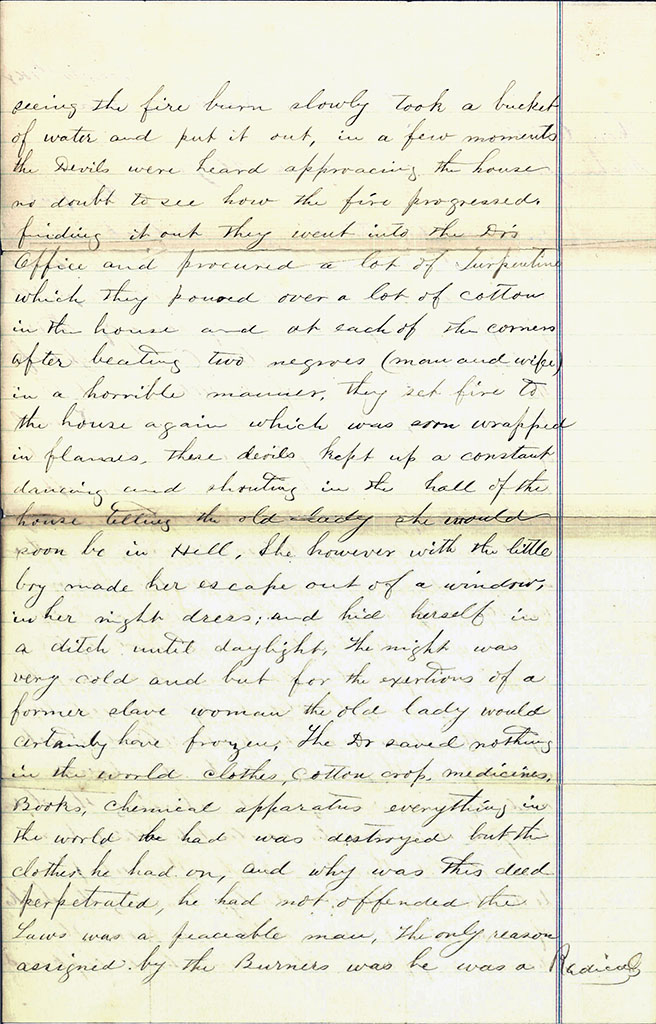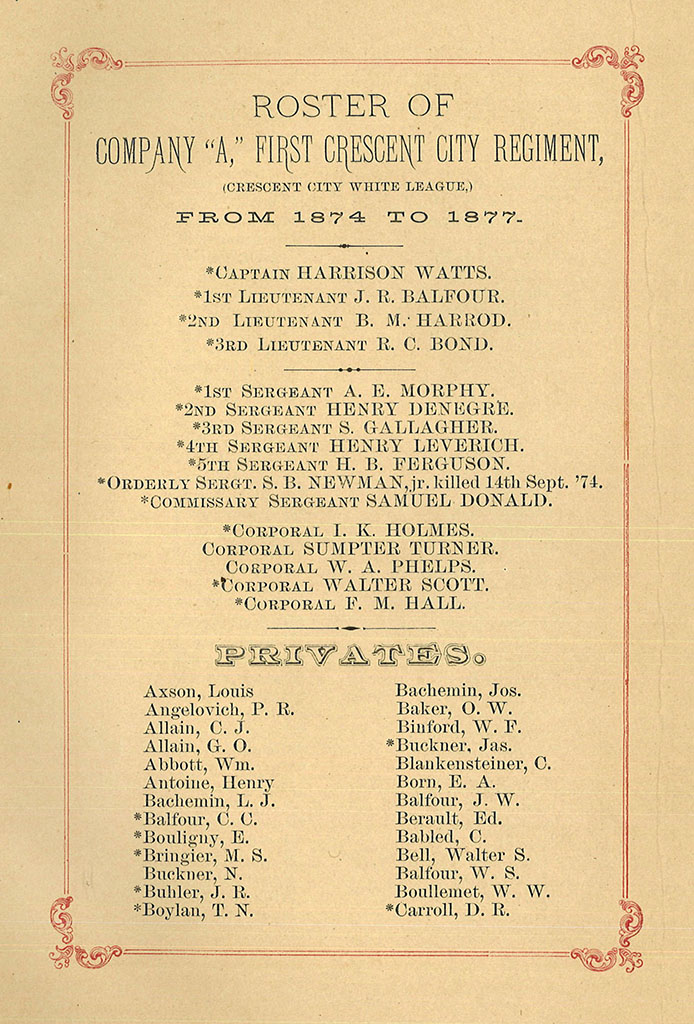Riot or Massacre?
One of the things that necessitated a military occupation of the South was its unwillingness or inability to protect the newly freed and their allies from attack. In the months after the war’s end, widespread violence was common, either engulfing a community spontaneously or being used as a calculated warning.
we say if possible
That the agents of the Bureau desire to do justice, we have no doubt, but under the skillful manipulation of the President, their power is about equal to that of a man of straw. And if nothing comes of this matter, we shall not be surprised. As to redress in the civil courts, we can only say that, outside of the cities, the freedmen have no hope anywhere. We have yet to learn that the authorities of Baldwin have moved in this matter; and if they have, every one knows that no jury could be gathered to convict the guilty parties, were an angel from heaven to bear testimony to their crime.
From an 1866 article about an attack on an African American family in their home. It argues that the Freedmen’s Bureau has little power to help, and no local jury would convict the perpetrators anyway.
“Outrage in Baldwin County,” Nationalist (Mobile), Aug. 9, 1866.
under arms all day
On the 1st inst., some negroes fired on and wounded a white citizen in Memphis. The next morning the sheriff, with a posse, attempted to disarm all the negroes, when they fled to Fort Pickering, firing as they ran. They were driven from the Fort, and sought the woods. During the excitement seven negroes and one citizen were killed, and a few houses burned. The military were under arms all day. In the evening a fire was raging among the negro quarters, no effort being made to stop it. In all, 15 blacks and 4 whites were killed.
A short article reporting on a race riot in Memphis which saw 46 killed and 75 injured. It foregrounds the perceived violence and cowardice of African Americans rather than the actions of whites.
“Negro Riot in Memphis,” Livingston Journal, May 5, 1866.
Election Violence
12. Was any obstruction offered at the polls calculated to prevent a free and full vote …?
Yes; a large number of men, drunk and disorderly, flourished pistols and threatened lives. One man was knocked down and beaten. Another was assaulted at the polls, and the ticket torn from his hand, and had to flee for safety. Two negroes were stabbed by United States soldiers sent as a guard to this county. Mr. Yordy closed the polls for two hours. Men were thus driven from the polls by fear of personal violence. …
From a county-by-county government report on the 1868 election in Alabama — the first held after people of color were guaranteed the right to vote.
Though this entry on Greene County indicates most of the proper procedures were followed there, these were not enough to prevent the polls from being a dangerous place for African American voters and Unionists.
Election in Alabama: Letter from the Secretary of War, transmitting a communication from the general of the army, with a report by Major General Meade, commanding 3d military district…, 1868. [Alabama Collection, JK4595 .U54 1868x]
preconcerted plan
The responsibility of the trouble, we have no doubt, rests on the Republican speakers. We only blame the Democrats for being present, for had they stayed away no opportunity would have been given the Radicals for carrying out their, to us, preconcerted plan.
From an article on violence in Greene County around the 1870 election. Though it blames Republicans, it says Democrats shouldn’t have been there to get mixed up in it. It doesn’t mention the role of the Klan.
“The Eutaw Affair,” South Alabamian (Greenville), Nov. 5, 1870.
quite sanguinary
The difficulty grew out of the abuse of a negro who had voted the democratic ticket, by several radical negroes, chief among whom was one very bad negro named Milas Long. Several white gentlemen rushed up when they saw the abuse being heaped upon the democratic negro, and when he had received several blows they rushed in and ordered the mob to desist. Milas Long, we are told, offered to draw a pistol upon Mr. Charles. E. Goodwin, when he was told not to draw a weapon there, or he would be killed. With an oath against the whites, and daring them to come on, he whipped out his pistol and fired.
From an article on violence in Barbour County around the 1874 election. It claims it all stared with an attack by African American Radicals on a Black Democrat, who was then protected by whites. Even if this was essentially true, the whole incident was being framed as Black aggression for effect.
“Eufaula: Election Day and Its Bloodshed,” Southern Argus (Selma), Nov. 13, 1874.
Organized White Supremacy
The earliest white supremacist vigilante organization, the Ku Klux Klan, was a powerful insurgent force, a loose confederation of autonomous local groups who operated in secret. After it was defeated around 1871, the groups that took up its mantle were more organized, more paramilitary in nature, and operating in the open.
dismal and ghastly
The evident moving of the spirits, aided by the living members of the mysterious Ku-Klux-Klan, has excited a consternation in this city, which has not been equalled since the dark, dismal and ghastly times of Shakspeare. The “Klan” is a secret but most powerful organization of living and dead men, who prowl about in the dark hours of the night, seeking whom they may devour. They know the political sentiments of every living man, being represented by a spirit at every fireside. They hold their meetings at midnight in dark caverns, and thousands of names are on their muster rolls. Sooner or later they may plant their cannons and blow this city into atoms.
From an 1868 satirical report mocking people’s fear of the Klan. It depicts members as supernatural creatures — like the devil in a familiar biblical passage, “a roaring lion, seeking whom he may devour” (1 Peter 5:8).
Partial text of the article can be found on the Transcripts page.
“K: K: K: The Spirits Moving; The Bloody Mouth at Hand; Flight of the Scalawags,” Jacksonville Republican, Mar. 28, 1868. [via Newspapers.com]
The Klan in Sumter County

He saved nothing in the world clothes, cotton crop, medicines, Books, chemical apparatus everything in the world he had was destroyed but the clothes he had on, and why was this deed perpetrated, he had not offended the laws, was a peaceable man, they only reason assigned by the Burners was he was a Radical.
From a Dec. 21, 1868, letter from Dan Price to State Rep. Charles Pierce, detailing Klan violence against a Republican doctor named Gerard Choutteau.
As Price describes the event, a group of men burned Choutteau’s house and barn, after stopping to beat an African American couple “in a horrible manner.” His mother-in-law and son escaped out a window, then they hid overnight in a ditch. Price credits a formerly enslaved woman for helping rescue them before they froze.
Text of the whole letter can be found on the Transcripts page.
Dan Price letter, MSS.3713 (Info about the collection)
The Klan in Macon County
![Page 3 of a handwritten document, text as follows: and marries a negroe & carries [?] to his white wife no long the negroe stench you can no long hold without she have and keep with the hounds Now pay attention to order & dont mistake their meaning First you must within two weeks come out in the Tuskegee News abandoning your republicanism Secondly you are to resign within thirty days your position as cou mailman & use your best efforts to defeat the negroe party in this county you are to put a check upon your backbiting & scandalizing which you have done when you have done when you have had an opertunity you are too mean & cowardly to come out openly with such all these these must & shall be ended.
Your lying tongue must cease its abuse of men your superiors some of whom if not quite old enough for your father. You are no to move from this place for two years as you are to aid the peple here to throw off the yoke that you have helped to place upon their necks you must go to work in good [?] to undo the hellish work you have already done. This letter & its contents are not to be used in any way to cause military or political hardships to be visited upon the people nor cause your own promotion to office upon the penalty of loosing your life go home & stay with your family at night & try to change your black heart as your ways must and shall To these things quietly & without a noise as we don’t wish to hurt you for the sake of your family. These orders seem to you](https://apps.lib.ua.edu/blogs/digitalexhibits/files/2020/06/Recon_Sec2_MaconCoKKK_pg2.jpg)
This letter & its contents are not to be used in any way to cause military or political hardships to be visited upon the people nor cause your own promotion to office upon the penalty of loosing your life go home & stay with your family at night & try to change your black heart as your ways must and shall Do these things quietly & without a noise as we don’t wish to hurt you for the sake of your family.
From a July 1870 letter to W. B. Bowen, ordering him to publicly renounce the Republican party or face harsh consequences. The writers, signing themselves Macon County K.K.K., say he must actively work against the “negro party,” to undo the “hellish work” he has already done.
Text of the whole letter can be found on the Transcripts page.
Citizens of Macon County Ku Klux Klan letter, MSS.0303 (Digitized item) (Info on the collection)
our utter desolation
Need we draw a picture of our utter desolation? Need we point on the one hand to our devastated fields, our waning commerce, our idle workshops, our decreasing population, our increasing taxes.
Instead of improving in his capacity to make an intelligent and patriotic use of the ballot, we do not hesitate to affirm that [the negro] is to-day less qualified for the duties of self-government than he was seven years ago.
From an 1874 statement of the White League in Louisiana, printed in the newspaper. It describes the state’s problems and blames them on voters of color, who they say have become even more naïve since they gained suffrage.
“A Splendid Document; Address of the Crescent City White League — the Platform of the White People of Louisiana — Adopted Unanimously,” Birmingham Iron Age, July 16, 1874. [via Newspapers.com]
The White League

The roster for a “regiment” of the White League, a paramilitary white supremacist group. One member is listed as having been killed on Sept. 14, 1874 — the date of a major attack on the state house in New Orleans.
The incident is known as the Battle of Liberty Place, indicating its scale and military nature. Thousands of White League members, largely Confederate veterans, took part in the insurrection. Their goal was to oust the Republican governor and return control of the government to the Democrats, in the wake of a contested election. They were opposed by the Louisiana state militia and the integrated New Orleans Metropolitan Police — ironically under the command of James Longstreet, a former Confederate general.
In the aftermath, federal troops were sent to the city to keep the peace, to be withdrawn only after the Compromise of 1877.
Roster of the 1st Crescent City Regiment, Col. W. T. Vaudry commanding, to April 25th, 1877. [Rare Books Collection, HS2330.C7 C7 1877x]